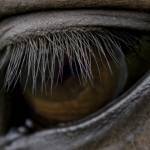Horses with Eye Problems May Have Higher Colic Risk

Horses admitted to veterinary hospitals sometimes develop colic in addition to their primary diseases. Colic can affect horses that are hospitalized due to changes in diet, decreased intake of feed and water, stress, or other conditions.
Researchers at the University of Georgia uncovered evidence that horses admitted to veterinary clinics for treatment of eye problems were far more likely to develop colic than horses admitted for other problems. When they looked at the records of 337 horses admitted for treatment of glaucoma, uveitis, or other eye conditions, they found that more than 20% of horses in this group developed some degree of colic while at the clinic. Most of the colic cases were mild and did not require surgery.
When all hospitalized horses are considered, figures from some surveys show that colic occurs in only about 3 to 9% of horses while they are at a clinic, so the 20% is quite high in comparison. The Georgia study did not turn up an explanation, but did determine that the high rate of colic was probably not related to medications used. Age of the horse (less than a year or more than 20 years old) and length of the hospital stay (more than eight days) increased the risk of colic in this group.
Eye disease in hospitalized horses does not directly cause colic, and colic does not directly cause eye disease. However, owners and veterinarians should recognize that for whatever reason, older horses and those hospitalized for more than a week for treatment of eye disease might be more at risk for colic than horses in other groups. This information could be used to manage these horses so as to avoid or lessen the severity of colic episodes.








